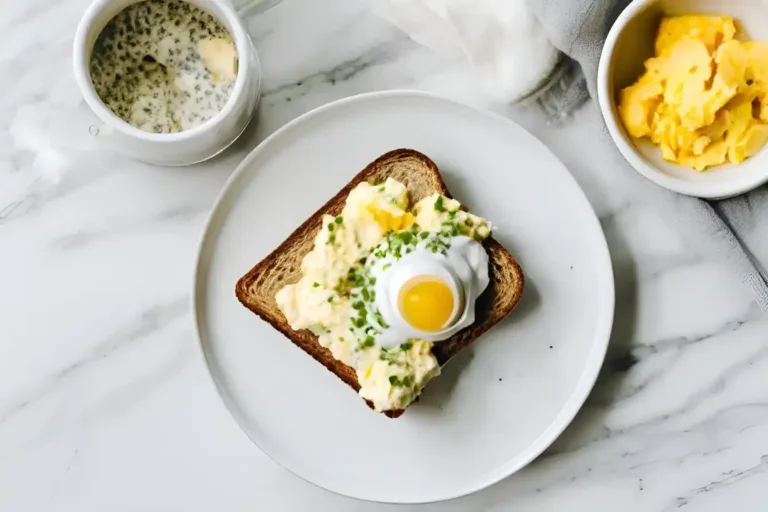What are good high-protein breakfasts?
A good high-protein breakfast includes foods like eggs, Greek yogurt, cottage cheese, tofu, and lean meats. These meals help keep you full, boost energy, and support muscle growth. For example, a breakfast of three scrambled eggs with cheese and whole-grain toast provides about 30 grams of protein. A Greek yogurt parfait with almonds and berries offers around 25 grams of protein, while a tofu scramble with avocado delivers a plant-based alternative with 20 grams of protein. Choosing high-protein foods in the morning helps prevent mid-morning hunger and keeps you energized throughout the day.
You’ve probably heard the saying, “Breakfast is the most important meal of the day.” But if your idea of breakfast is a sugary cereal or a sad piece of toast, your morning could use a serious protein boost. High-protein breakfasts help you stay full longer, curb cravings, and give you steady energy to power through your day.
Protein isn’t just for bodybuilders—it’s essential for everyone. Whether you’re hitting the gym, tackling a busy workday, or simply trying to avoid that mid-morning slump, starting your day with protein can make all the difference. And don’t worry, you don’t need to down raw eggs like Rocky to get the benefits.
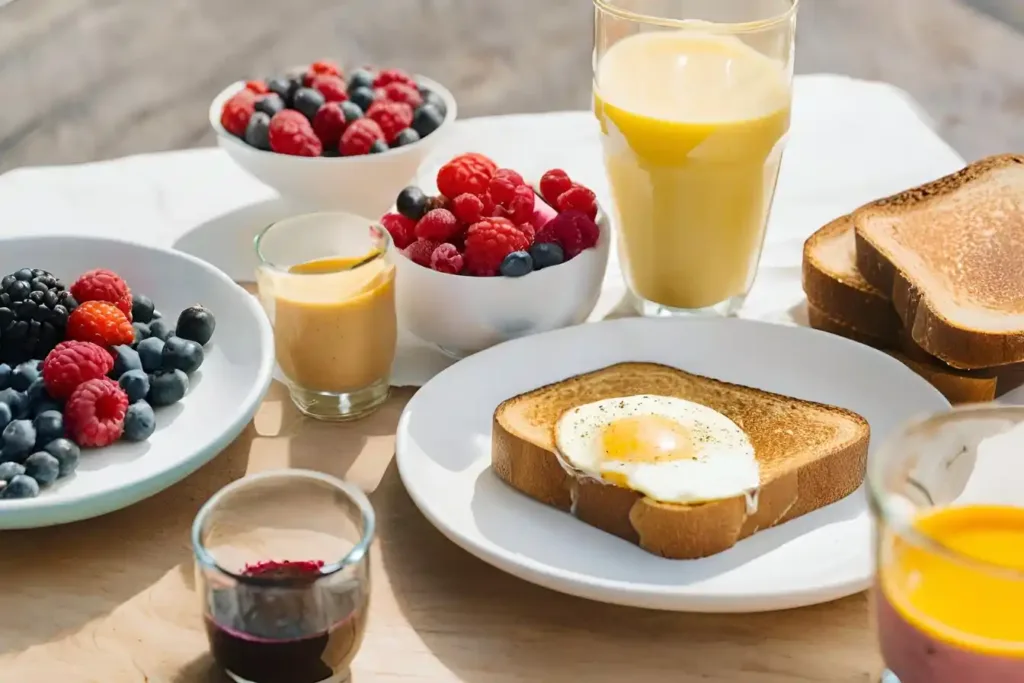
How Protein Helps Start Your Day Right
Think of protein as the VIP guest at your breakfast table. While carbs and fats have their place, protein plays a crucial role in keeping your metabolism humming and your body fueled. Here’s why:
- Boosts Metabolism: Your body burns more calories digesting protein than it does with carbs or fats. That means you’re torching calories just by eating!
- Keeps You Full Longer: Ever feel hungry an hour after a donut? That’s because sugary breakfasts spike your blood sugar, leading to a crash. Protein keeps hunger at bay.
- Supports Muscle Growth & Recovery: Whether you’re lifting weights or just carrying groceries, your muscles need protein to repair and grow.
- Stabilizes Blood Sugar Levels: No more rollercoaster energy crashes—protein helps keep your blood sugar steady, reducing cravings for junk food later in the day.
Who Benefits Most from a Protein-Packed Breakfast?
The short answer? Pretty much everyone. But some people will see even greater benefits from making protein a breakfast priority.
- Fitness Enthusiasts: If you work out regularly, you need protein to support muscle recovery and performance.
- Busy Professionals & Students: Need to focus? Protein helps with mental clarity and concentration, making it a must for long workdays and study sessions.
- People Trying to Lose Weight: Protein helps reduce hunger, so you’re less likely to reach for unhealthy snacks before lunch.
- Vegetarians & Vegans: A well-planned high-protein breakfast ensures you get enough essential nutrients without relying on animal products.
The Science Behind Protein for Energy and Satiety
Protein isn’t just about muscle—it’s about maintaining steady energy throughout the day. Studies show that a protein-rich breakfast helps regulate ghrelin, the hormone responsible for hunger. That means fewer snack attacks before lunch and a greater sense of fullness.
How Protein Helps Control Hunger
When you eat protein, your body slows down digestion, which keeps you feeling satisfied longer. Unlike simple carbs that cause quick spikes and crashes, protein provides a slow, steady release of energy.
Common Myths About High-Protein Breakfasts
Not everyone is on board with the idea of loading up on protein in the morning. Let’s bust some of the biggest misconceptions.
Do You Need Meat for a Protein-Rich Breakfast?
Nope! While meat is a great source of protein, there are plenty of other options. Eggs, Greek yogurt, tofu, nuts, and legumes are all excellent choices. Whether you’re vegetarian, vegan, or just looking for variety, there’s a high-protein breakfast option for you.
Best Sources of Protein for Breakfast
When it comes to starting your day right, choosing the best sources of protein for breakfast can make all the difference. But with so many options, it’s easy to get overwhelmed. Should you go for eggs? Greek yogurt? A protein smoothie? The good news is that there are plenty of choices, whether you’re an omnivore or prefer plant-based meals.
Protein is crucial for keeping you full, building muscle, and providing steady energy throughout the day. The key is to pick the right sources and balance them with healthy fats and fiber to create a well-rounded meal.
Animal-Based Proteins: Eggs, Dairy, and Meat
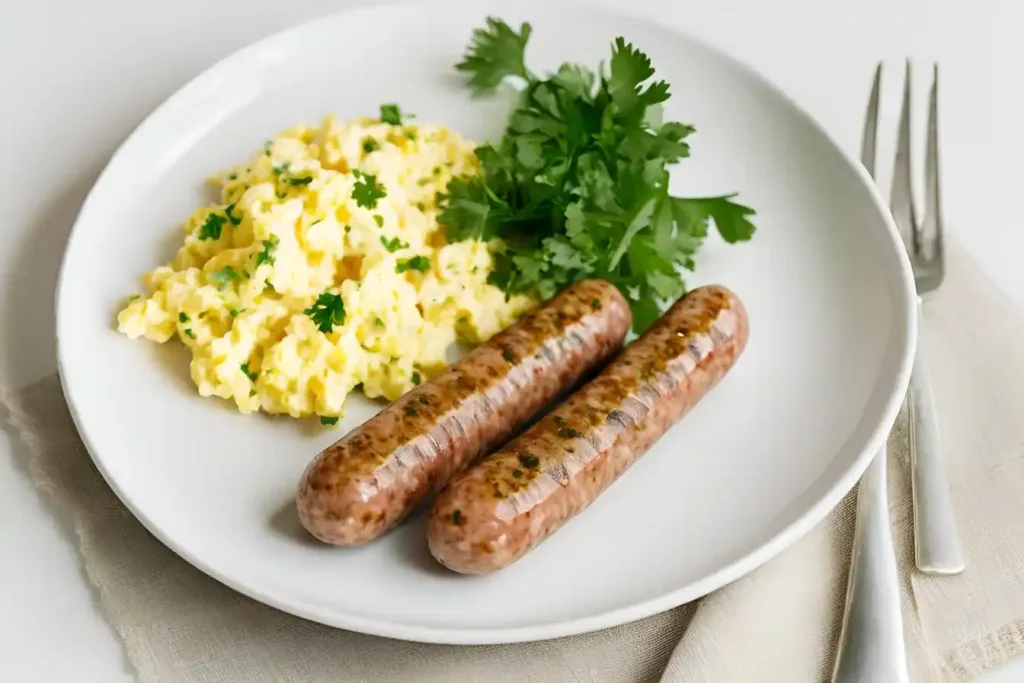
Animal-based proteins are some of the most popular breakfast choices because they are complete proteins, meaning they contain all nine essential amino acids your body needs.
Eggs: The Breakfast Superstar
Eggs are one of the best high-protein foods you can eat in the morning. They’re not only packed with protein but also loaded with important nutrients like choline, which supports brain health. Plus, they’re incredibly versatile—scrambled, poached, hard-boiled, or made into an omelet, eggs are a breakfast champion.
- Protein Content: About 6 grams per egg
- Bonus Nutrients: Healthy fats, B vitamins, and antioxidants
Greek Yogurt: Creamy and Protein-Packed
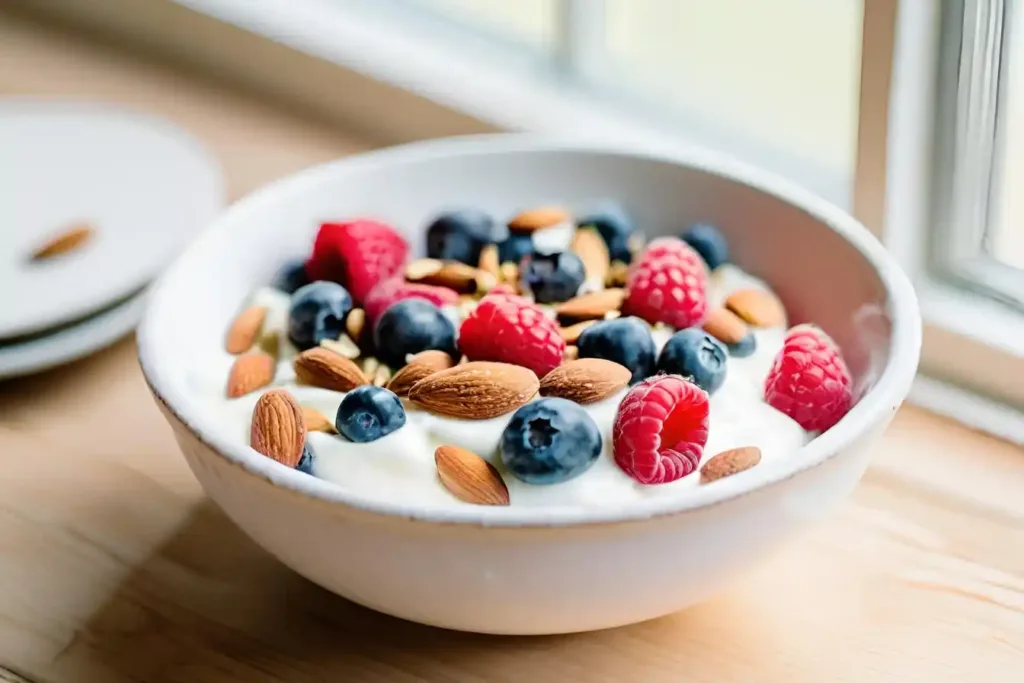
Greek yogurt is a fantastic option if you’re looking for a high-protein breakfast without cooking. It has nearly double the protein of regular yogurt and is rich in probiotics, which support gut health. Add some berries, nuts, and a drizzle of honey for a delicious, nutritious breakfast.
- Protein Content: Around 15-20 grams per cup
- Bonus Nutrients: Calcium, probiotics, and vitamin B12
Lean Meats: Not Just for Dinner
Who says meat is only for lunch and dinner? Turkey sausage, chicken breast, and lean ham can all be excellent sources of protein for breakfast. These options provide long-lasting energy and keep you feeling full.
- Protein Content: Around 20-25 grams per serving
- Bonus Nutrients: Iron and B vitamins for energy production
Plant-Based Proteins: Legumes, Nuts, and Seeds
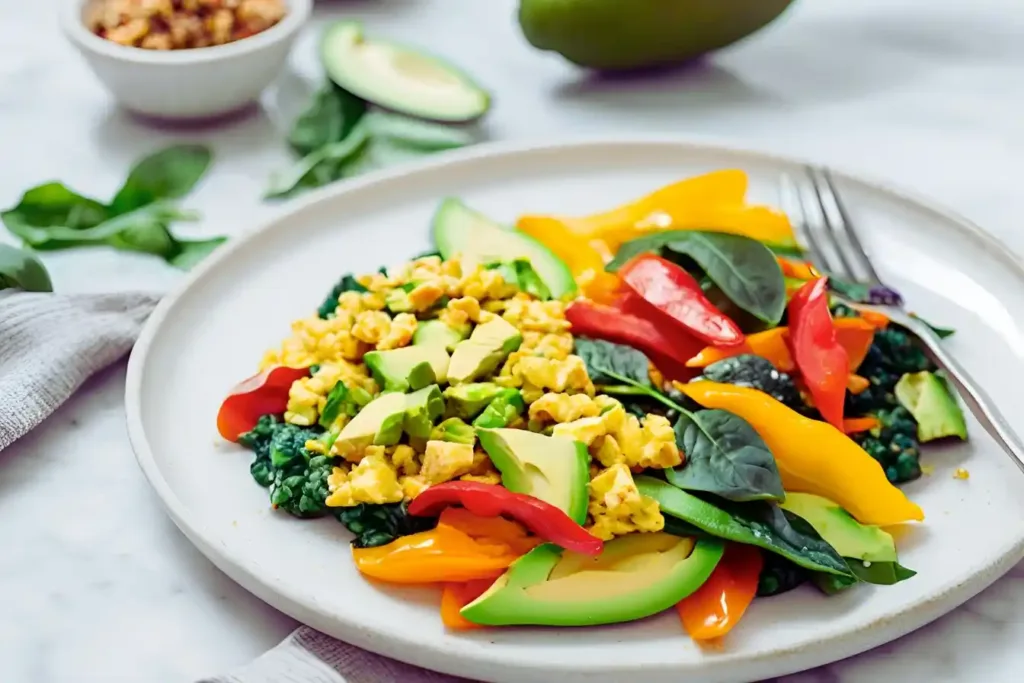
If you’re vegetarian or vegan, there are still plenty of great protein options to power up your breakfast.
Legumes: Beans for Breakfast? Yes!
While it might sound unusual, beans are a fantastic source of protein and fiber. Adding black beans or lentils to a breakfast burrito or avocado toast can increase the protein content significantly.
- Protein Content: Around 7-9 grams per half-cup
- Bonus Nutrients: Fiber, folate, and iron
Nuts and Nut Butters: A Crunchy, Delicious Boost
Almonds, walnuts, and peanut butter are all excellent sources of protein and healthy fats. They make great toppings for oatmeal, yogurt, or smoothies.
- Protein Content: 6-8 grams per ounce
- Bonus Nutrients: Healthy fats and vitamin E for skin and heart health
Seeds: Small but Mighty
Chia seeds, flaxseeds, and hemp seeds may be tiny, but they’re packed with protein and essential fatty acids. Adding a spoonful to your smoothie, yogurt, or oatmeal can make a huge difference.
- Protein Content: Around 5 grams per tablespoon
- Bonus Nutrients: Omega-3s for brain health and fiber for digestion
How to Combine Proteins for a Balanced Meal
One of the best ways to maximize your protein intake is to combine different sources. For example:
- A Greek yogurt parfait with chia seeds and almonds
- A scrambled egg and black bean breakfast burrito
- A smoothie with protein powder, peanut butter, and flaxseeds
Substituting Common Ingredients for More Protein
Want to sneak extra protein into your breakfast? Try these swaps:
- Swap regular yogurt for Greek yogurt to nearly double your protein intake.
- Use almond flour instead of regular flour for protein-packed pancakes.
- Add a scoop of protein powder to your oatmeal or smoothies.
How Much Protein Do You Need in the Morning?
Now that you know what to eat, let’s talk about how much protein you should aim for at breakfast.
Recommended Protein Intake for Different Goals
Your protein needs depend on your lifestyle and health goals. Here’s a general guideline:
- For general health: Aim for 15-20 grams of protein at breakfast.
- For muscle building: Go for 25-30 grams to support recovery and growth.
- For weight loss: Stick to 25-30 grams to help control hunger and reduce cravings.
Signs You’re Not Getting Enough Protein
If you’re not eating enough protein in the morning, your body will let you know. Look out for these signs:
- Hunger soon after eating (your breakfast isn’t keeping you full)
- Low energy levels (protein helps with sustained energy)
- Muscle weakness or slow recovery (especially if you work out regularly)
Best Ways to Prepare High-Protein Breakfasts
Even if you’re short on time, there are plenty of quick and easy ways to get a high-protein meal in the morning.
Quick Breakfasts for Busy Mornings
If you’re always on the go, try these fast, protein-packed options:
- Hard-boiled eggs and almonds for a grab-and-go meal
- Overnight oats with chia seeds and protein powder
- Cottage cheese with fruit and nuts
- A protein smoothie with nut butter and seeds
7 Best High-Protein Breakfast Ideas
Now that we’ve covered the best protein sources, let’s dive into some delicious high-protein breakfast ideas. These meals are easy to make, packed with nutrients, and guaranteed to keep you full until lunch.
1. Scrambled Eggs with Spinach and Feta
Eggs are a breakfast classic, but adding spinach and feta takes them to the next level. Spinach provides fiber and vitamins, while feta adds a tangy, creamy touch.
Ingredients:
- 2 large eggs
- ½ cup fresh spinach, chopped
- 1 oz feta cheese, crumbled
- 1 tsp olive oil
- Salt and pepper to taste
Instructions:
- Heat olive oil in a skillet over medium heat.
- Add spinach and cook until wilted.
- Beat eggs in a bowl, then pour them into the skillet.
- Stir gently until eggs are fully cooked.
- Sprinkle with feta cheese, season with salt and pepper, and enjoy!
Nutrition (per serving):
- Protein: 18g
- Calories: 250
- Carbs: 3g
- Fats: 18g
2. Greek Yogurt Parfait with Nuts and Berries
Greek yogurt is an easy, protein-rich option. Adding nuts and berries makes it even more satisfying.
Ingredients:
- 1 cup Greek yogurt
- ¼ cup mixed berries (strawberries, blueberries, raspberries)
- 2 tbsp almonds or walnuts, chopped
- 1 tsp honey (optional)
Instructions:
- In a bowl or glass, layer Greek yogurt, berries, and nuts.
- Drizzle with honey if desired.
- Enjoy immediately or refrigerate for later.
Nutrition (per serving):
- Protein: 20g
- Calories: 250
- Carbs: 20g
- Fats: 10g
3. High-Protein Oatmeal with Chia Seeds and Peanut Butter
Oatmeal doesn’t have to be a carb-heavy breakfast. Adding protein-packed ingredients like chia seeds and peanut butter boosts its nutritional value.
Ingredients:
- ½ cup rolled oats
- 1 cup milk (or plant-based milk)
- 1 tbsp chia seeds
- 1 tbsp peanut butter
- ½ tsp cinnamon
Instructions:
- Cook oats with milk according to package instructions.
- Stir in chia seeds, peanut butter, and cinnamon.
- Enjoy warm, topped with fruit or nuts if desired.
Nutrition (per serving):
- Protein: 18g
- Calories: 320
- Carbs: 35g
- Fats: 12g
4. Cottage Cheese and Avocado Toast
If you love avocado toast, try adding cottage cheese for a protein boost.
Ingredients:
- 1 slice whole-grain bread
- ½ avocado, mashed
- ½ cup cottage cheese
- Salt, pepper, and red pepper flakes to taste
Instructions:
- Toast the bread until golden.
- Spread mashed avocado on top.
- Add a layer of cottage cheese.
- Sprinkle with salt, pepper, and red pepper flakes.
Nutrition (per serving):
- Protein: 22g
- Calories: 300
- Carbs: 28g
- Fats: 15g
5. Protein Pancakes
These pancakes are made with almond flour and eggs for a protein-packed, gluten-free breakfast.
Ingredients:
- 2 eggs
- ½ cup almond flour
- 1 scoop protein powder
- ¼ tsp baking powder
- ½ cup milk (or plant-based milk)
- 1 tsp vanilla extract
Instructions:
- In a bowl, whisk eggs, protein powder, and almond flour.
- Add baking powder, milk, and vanilla, then mix until smooth.
- Cook pancakes on a heated skillet, flipping when bubbles form.
- Serve with fresh fruit or a drizzle of maple syrup.
Nutrition (per serving):
- Protein: 25g
- Calories: 350
- Carbs: 20g
- Fats: 15g
6. Smoked Salmon and Cream Cheese Wrap
For a quick and savory breakfast, try a smoked salmon wrap.
Ingredients:
- 1 whole wheat tortilla
- 3 oz smoked salmon
- 2 tbsp cream cheese
- 1 tbsp capers (optional)
- ¼ cup sliced cucumber
Instructions:
- Spread cream cheese on the tortilla.
- Layer smoked salmon, cucumber, and capers.
- Roll up the wrap, slice in half, and enjoy!
Nutrition (per serving):
- Protein: 23g
- Calories: 320
- Carbs: 28g
- Fats: 14g
7. Tofu Scramble with Veggies
A great plant-based alternative to scrambled eggs, this dish is packed with protein and flavor.
Ingredients:
- ½ block firm tofu, crumbled
- ½ cup bell peppers, chopped
- ¼ cup onions, chopped
- 1 tsp olive oil
- ½ tsp turmeric
- Salt and pepper to taste
Instructions:
- Heat olive oil in a pan over medium heat.
- Add onions and bell peppers, cooking until soft.
- Stir in crumbled tofu and turmeric.
- Cook for 5 minutes, season with salt and pepper, and serve.
Nutrition (per serving):
- Protein: 20g
- Calories: 270
- Carbs: 12g
- Fats: 15g
How to Plan a Week’s Worth of High-Protein Meals
Meal prepping high-protein breakfasts saves time and ensures you always have a nutritious meal ready. Here’s how to do it:
- Batch-cook eggs: Hard-boil a dozen eggs at the start of the week.
- Pre-mix dry oatmeal ingredients: Store oats, chia seeds, and nuts in portioned containers.
- Make smoothie packs: Freeze fruit, spinach, and protein powder in bags for easy blending.
- Prepare high-protein muffins: Use almond flour and Greek yogurt in your muffin recipes.
Storage Tips for High-Protein Ingredients
- Eggs: Store hard-boiled eggs in the fridge for up to a week.
- Greek yogurt: Keep sealed in the fridge and use within 7 days after opening.
- Cottage cheese: Store in an airtight container and consume within 5 days.
- Nut butters: Keep at room temperature for easy spreading or refrigerate for longer shelf life.
Keeping Your Breakfast Fresh and Nutritious
- Use airtight containers to prevent spoilage.
- Freeze portions of cooked meals to avoid food waste.
- Rotate your breakfast choices to keep things interesting.
FAQs About What Are Good High-Protein Breakfasts?
What breakfast has the highest protein?
The highest-protein breakfast is steak and eggs with a side of Greek yogurt, delivering over 50 grams of protein. A plant-based alternative is a tofu scramble with quinoa and peanut butter toast, which packs around 40 grams of protein.
How can I get 30g of protein for breakfast?
You can get 30 grams of protein by eating three scrambled eggs with cheese and whole-grain toast. Another option is a Greek yogurt parfait with almonds and chia seeds. A protein smoothie with protein powder, peanut butter, and milk also works.
What is a good protein goal for breakfast?
A good protein goal depends on your needs. For general health, aim for 15 to 20 grams. If you’re building muscle or trying to lose weight, 25 to 30 grams is ideal. A higher protein intake helps with satiety and muscle repair.
What is the best high-protein breakfast for weight loss?
The best high-protein breakfast for weight loss includes eggs with avocado and whole-grain toast. Cottage cheese with berries and flaxseeds is another great option. A protein smoothie with almond butter and spinach is also filling and nutrient-dense.
Are smoothies a good high-protein breakfast?
Yes, if they contain enough protein. A well-balanced smoothie should include protein powder, Greek yogurt or nut butter, and a liquid base like milk or almond milk. This ensures it keeps you full and provides sustained energy.
Can I get enough protein without eggs?
Yes, you can get plenty of protein without eggs. Greek yogurt with nuts and seeds, tofu scrambles, chia pudding with almond butter, and overnight oats with protein powder are all excellent alternatives that provide similar protein levels.
What are some high-protein vegetarian options?
Vegetarian high-protein breakfasts include cottage cheese with walnuts and honey, quinoa porridge with almonds, and chickpea flour pancakes with avocado. Combining plant-based proteins like legumes, nuts, and seeds ensures a balanced meal.

